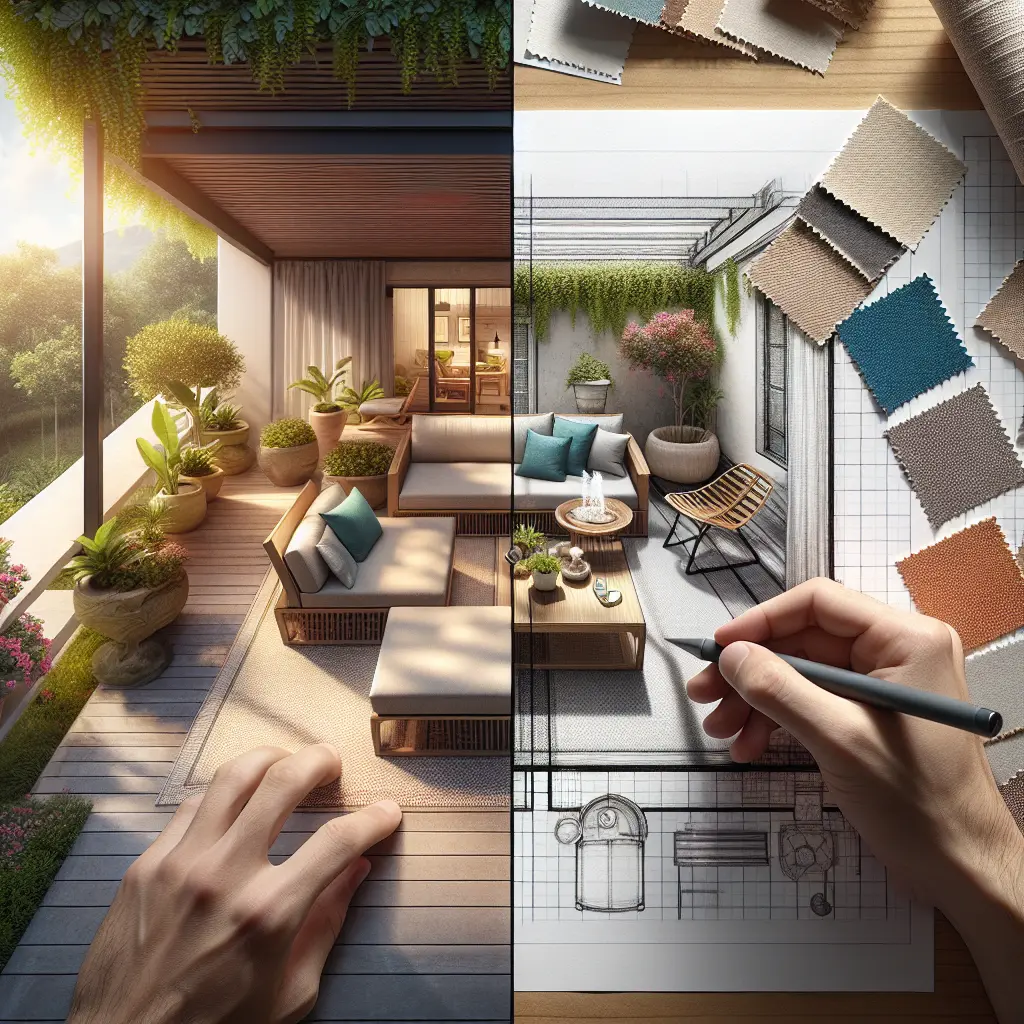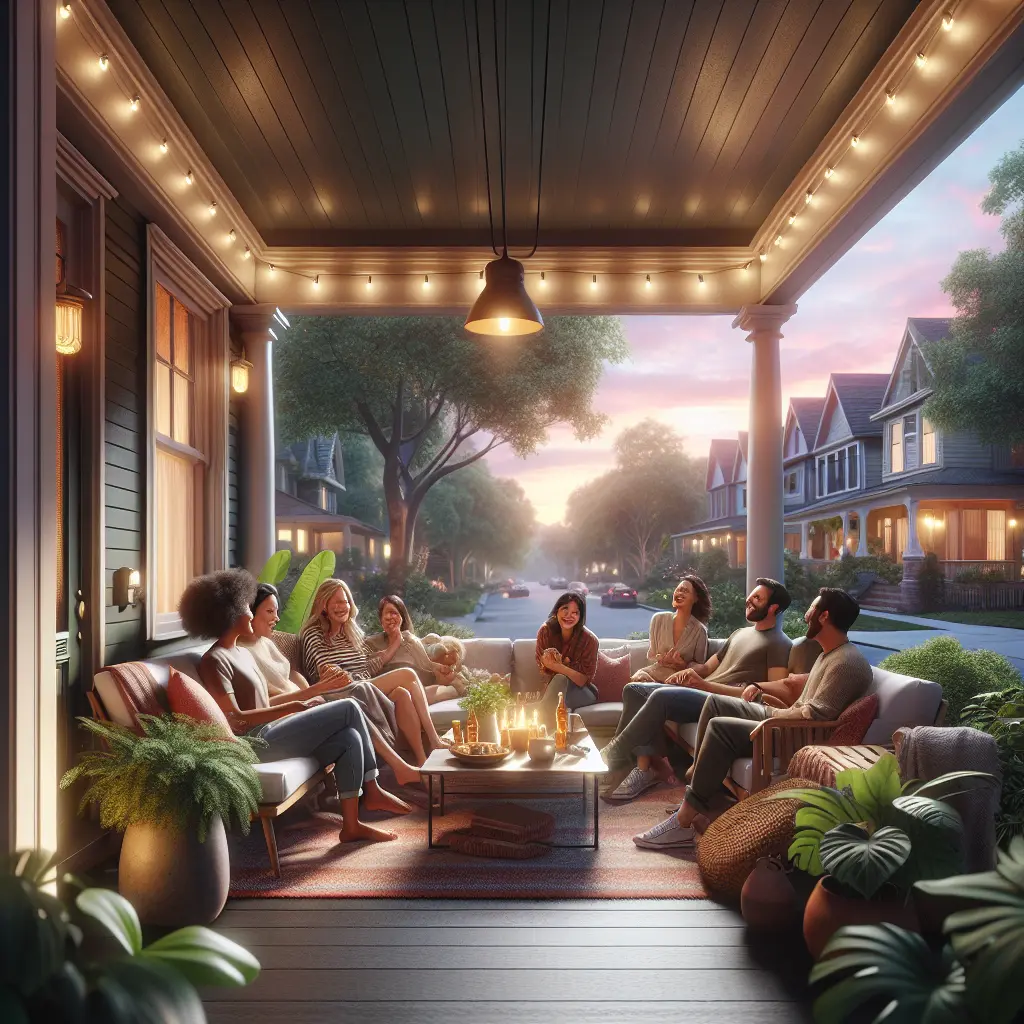Porches have always been more than just architectural features; they’re the bridge between our private spaces and the world outside. As someone who’s spent years studying the impact of intermediate spaces on well-being, I’ve seen firsthand how porches can transform our daily lives. Let’s explore why these threshold spaces are crucial for our health and happiness.
Jump to:
The Porch: A Gateway to Well-Being
Porches serve as a unique intermediate space between our homes and the outside world. They offer a sheltered environment where we can enjoy the benefits of being outdoors without fully leaving the comfort of our homes. This balance is key to understanding why porches can significantly enhance our well-being.
Stress Reduction and Relaxation
One of the most immediate benefits of spending time on a porch is stress reduction. The simple act of stepping outside onto your porch can have a profound effect on your stress levels. Research has shown that exposure to natural environments, even in small doses, can lower cortisol levels – the hormone associated with stress.
When you sit on your porch, you’re giving yourself a moment to disconnect from indoor stressors and connect with the natural world. The gentle breeze, the sounds of birds chirping, or even the distant hum of neighborhood activity can all contribute to a sense of calm and relaxation.
Improved Sleep Quality
The quality of our sleep is intrinsically linked to our overall well-being. Interestingly, spending time on your porch can contribute to better sleep patterns. This is partly due to exposure to natural light, which helps regulate our circadian rhythms.
When we spend time on our porches, especially in the morning or early evening, we’re exposing ourselves to natural light cycles. This exposure helps our bodies understand when it’s time to be alert and when it’s time to wind down for sleep. Over time, this can lead to more consistent and restful sleep patterns.
Increased Vitamin D Intake
Vitamin D, often called the “sunshine vitamin,” is crucial for our overall health. It plays a vital role in bone health, immune function, and mood regulation. While we can get vitamin D from certain foods, our bodies produce it most efficiently when our skin is exposed to sunlight.
Spending time on your porch allows for safe sun exposure, helping your body produce the vitamin D it needs. Even short periods of sun exposure can be beneficial, and the sheltered nature of a porch allows you to control your exposure more easily than in an open outdoor space.
Enhanced Social Connections
Porches have long been a space for social interaction. They provide a comfortable setting for casual conversations with neighbors or for hosting small gatherings. These social interactions are crucial for our mental health and overall well-being.
Regular social interaction has been linked to reduced risks of depression, anxiety, and cognitive decline. By providing a space that bridges the private and public spheres, porches encourage these beneficial social connections.
Cognitive Benefits and Creativity
Exposure to nature, even in small doses, has been shown to improve cognitive function. This includes better attention span, improved memory, and enhanced creative thinking. The porch, as an intermediate space between indoors and outdoors, provides an ideal environment to reap these cognitive benefits.
Whether you’re reading a book, working on a project, or simply sitting and thinking, doing so on your porch can help boost your mental clarity and creativity.
Designing Your Porch for Maximum Well-Being

To fully harness the well-being benefits of your porch, consider these design elements:
- Comfortable Seating: Ensure your porch has comfortable seating options that encourage relaxation and longer stays.
- Natural Elements: Incorporate plants or hanging baskets to bring more nature into your porch space.
- Lighting: Install soft, warm lighting for evening use, allowing you to enjoy your porch even after sunset.
- Privacy Features: Consider adding screens or partial walls to create a sense of privacy without fully enclosing the space.
- Weather Protection: Implement features like retractable awnings or ceiling fans to make your porch comfortable in various weather conditions.
Seasonal Considerations for Porch Use
While porches are often associated with warm summer evenings, they can be beneficial year-round. Here’s how to maximize your porch use in different seasons:
Spring
- Enjoy the fresh air and blooming nature
- Use your porch for seed starting or small container gardening
Summer
- Create shade with umbrellas or awnings for comfortable daytime use
- Host evening gatherings to enjoy cooler temperatures
Fall
- Add warm blankets and outdoor heaters for cozy experiences
- Enjoy the changing colors of nature from your porch vantage point
Winter
- Install weatherproofing elements like clear vinyl curtains
- Use your porch for winter bird watching or enjoying snowy landscapes
By adapting your porch for year-round use, you can continue to reap its well-being benefits regardless of the season.
The Porch as a Mindfulness Space
In our fast-paced world, finding moments for mindfulness can be challenging. Your porch can serve as an ideal space for mindfulness practices. The semi-outdoor nature of a porch provides a perfect balance of comfort and connection to nature, making it easier to focus on the present moment.Consider using your porch for:
- Morning meditation or yoga sessions
- Mindful breathing exercises
- Journaling or reflective writing
- Quiet contemplation of nature
These mindfulness practices, when done regularly on your porch, can significantly contribute to stress reduction, improved mental clarity, and overall emotional well-being.
The Environmental Impact of Porch Living
Spending more time on your porch can also have positive environmental impacts. By enjoying your outdoor space more, you might find yourself:
- Reducing energy consumption by using less indoor lighting and air conditioning
- Becoming more aware of your local environment and wildlife
- Developing a greater appreciation for nature, potentially leading to more eco-friendly lifestyle choices
This connection between porch living and environmental consciousness can contribute to a sense of purpose and well-being, knowing that your lifestyle choices are having a positive impact on the world around you.

People Also Ask
How much time should I spend on my porch to see benefits?
Even short periods of 15-30 minutes daily can provide noticeable benefits. Consistency is more important than duration, so aim to make porch time a regular part of your routine.
Can I get the same benefits from a balcony or small outdoor space?
Yes, many of the benefits of porch time can be achieved with any outdoor or semi-outdoor space. The key is having a dedicated area that bridges indoor and outdoor environments.
How can I make my porch more conducive to relaxation?
Focus on comfort (cozy seating, soft textures), incorporate natural elements (plants, water features), and minimize distractions (use privacy screens, create a clutter-free space).
Conclusion
Porches offer a unique opportunity to enhance our well-being by providing a space that connects us with nature, promotes relaxation, and encourages social interaction. By intentionally designing and using our porches, we can create a powerful tool for improving our physical and mental health. Embrace your porch as more than just an architectural feature – it’s your personal gateway to enhanced well-being.
References:
- https://pubmed.ncbi.nlm.nih.gov/30804178/
- https://journals.sagepub.com/doi/abs/10.1177/0013916508319745
Show & Tell
We’d love to hear your thoughts about these ideas! Simply click the link to head over to your favorite platform and add your comments about this post there. We’d like to know about your insights, questions, or just saying hi.
Disclosure
Our content is reader-supported. This means if you click on some of our links, then we may earn a commission. Commissions do not affect our editor’s opinions or evaluations. Learn more about our editorial process.

About the Editorial Staff
The Curvspace editorial team comprises a diverse group of experts on intermediate and threshold spaces in homes and workplaces. Architects and interior designers, civil engineers and artists, environmental and behavioral psychologists, sociologists and anthropologists. All collaborate to create helpful content, that explores the full potential of these often-overlooked areas to enhance our daily lives.


